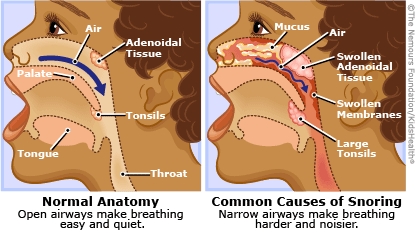For most kids, snoring is not a serious problem. The health care provider asked you and your child questions and examined your child to find the cause of the snoring. A sleep study might be needed to check how your child breathes during sleep.



Your child:

What is snoring? Snoring is the sound of the throat vibrating (moving back and forth very quickly) as air passes by. Snoring is more common during deep sleep, when muscles in the back of the throat relax, making the airway narrower and breathing noisier.
Why do some kids snore? Kids might snore if: